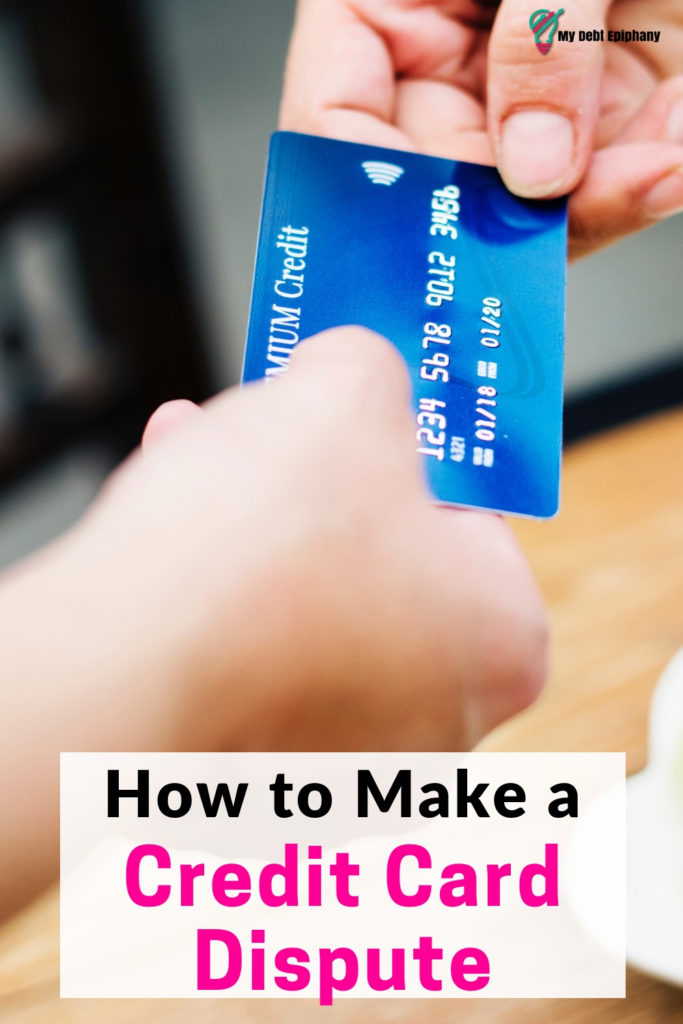How To Make a Credit Card Dispute
This post is by our regular contributor, Angelique.
When it comes to payment options, none is more popular in today’s society than the use of credit cards. Whether it is in person with a quick tap of a card or online with an even quicker tap of a button, credit cards make it easier than ever when making purchases but what happens when you review your statement and find charges you didn’t make?
The American Banking Association noted that at the end of 2017 there were 364 million open credit cards accounts in the U.S.
In that same year, 25% of American credit card holders filed a complaint with the Consumer Financial Protection Bureau regarding problems with a purchase shown on their statement.
When a credit card charge arises that is not one you have made it can be troubling and the dispute process can be difficult and stressful if you don’t know where to begin.
The information below will help you to file a credit card dispute with ease and get results.
Reasons You May Need To File a Credit Card Dispute
The most common reasons you may need to file a dispute are identified as and recognized by the Fair Credit Billing Act (FCBA) as “billing errors”:
- A charge for something you already successfully returned
- A charged for something you never received or accepted
- Unauthorized charges made on your credit card by an unsanctioned user
- Mathematical errors (such as an incorrectly entered tip amount by a server or a double charge on your credit card)
- A charge related to your statement being mailed to the wrong address after you have sent in a change of address form to the company in writing at least 20 days prior to the billing period end
- A charge without the correct date or price and
- Any charge where you ask for an explanation or proof of purchase, believe there is an error or need the charge clarified
As you decide to start your credit card dispute journey, these are the top reasons to keep in mind when making a claim.
How To Dispute a Charge
When an incorrect charge hits your bill many things may run through your mind. The first thing to do is to double check that this charge was not one that you simply forgot about making. While this may sound obvious, it happens more often than not and figuring this out from the beginning can save you a lot of hassle and stress.
Once it is confirmed that the charge was not made by you, immediately note if this charge is a fraudulent one. Fraudulent charges are handled differently than unauthorized charges. A fraudulent charge could be a charge on your card from a different state or country than you reside in and it was not made or authorized by you. You should contact your credit card company immediately to report these types of suspicious charges as your personal information could be compromised.
If the charge doesn’t appear to be fraudulent either, there are several routes you can take to make your claim. Here are some non-negotiables to make this process as smooth as possible:
Always Start at the Source
When you have a dispute to make, reaching out to the merchant first to find a resolution is the best idea as most merchants will work with you to make things right. If the merchant will not help you or they are no longer operational, you will then contact your credit card company.
Have Evidence to Back Up Your Claim
When speaking with a merchant and/or dispute claim clerk be sure to document the date, time, name of the person you spoke with and their ID if applicable as well as the comments made during the conversation. Copies of receipts, bank statements, credit card statements, emails, letters and any other documentation related to your claim are all great to help bolster your odds of winning the dispute.
You must pay the amount of your credit card bill that is not being disputed. The creditor may not take any legal or any other form of action regarding the disputed amount against you during the investigation.
For unauthorized uses of your card, the majority of credit card companies will accept a phone call to file your dispute claim. For unauthorized purchases of $50 or less, most credit card companies will provide a refund for those charges although it is not the law to do so.
However, once the amount is over $50, it can become quite difficult to dispute and receive a full chargeback of the funds to your credit card. The sooner you report the charges and provide the documentation necessary, the better.
When you have a billing error related dispute, the Federal Trade Commission (FTC) requires a letter with your name, account number, the dollar amount your disputing and your reason for the dispute. The letter must be mailed to the Billings Inquiry Department of the company within 60 days of you receiving the statement with the noted bill error. Some credit card companies may accept emails instead of a letter so be sure to check the company’s policy.
Once your claim is received and the credit card company has sent you an acknowledgment of your claim within 30 days of receiving it, an investigation that is considered “reasonable” is conducted. This investigation could include analyzing your signature on the credit card slip, comparing where a purchase was made versus where you live and even obtaining a police report.
Next Steps
Afterward, the company has two complete billing cycles or a 90-day period (whichever comes first) to contact you with their decision in writing. If the claim decision is in your favor, the charge and associated interest should be dropped. If the decision is to deny your claim, a written explanation is provided to you and a grace period is normally permitted for the charge unless you disputed it after the grace period.
If the original process does not provide the results you want, or you do not receive a response from the company you can file a formal complaint to the Consumer Financial Protection Bureau (CFPB) or take matters further through taking legal action against the credit card company to enforce your credit card dispute rights.
For more information, visit the FTC’s page here.

When You Shouldn’t Dispute a Charge
There is always another side to an issue and in this case, it is abusing the credit card dispute process. There are many times “friendly fraud”, or an illegitimate chargeback, takes place and this costs U.S. merchants a lot of money each year.
Your “unauthorized purchases” made by relative or friend, your buyer’s remorse or you’re dissatisfaction with a purchase (but haven’t spoken with the merchant yet) are all reasons to think twice about making a disputed charge.
As you use your credit card to make purchases, establishing a routine of regularly checking your statement to ensure that you aren’t paying for fake charges is a great way to take charge of in this area of your financial health. Be sure to review your monthly statement and if you find something that isn’t legitimate on your card then be sure to follow the steps above to find a solution.
Have you ever had to make a credit card dispute claim? If so, how was the process for you? What tips can you share?
Stop Worrying About Money and Regain Control

Join 5,000+ others to get access to free printables to help you manage your monthly bills, reduce expenses, pay off debt, and more. Receive just two emails per month with exclusive content to help you on your journey.






